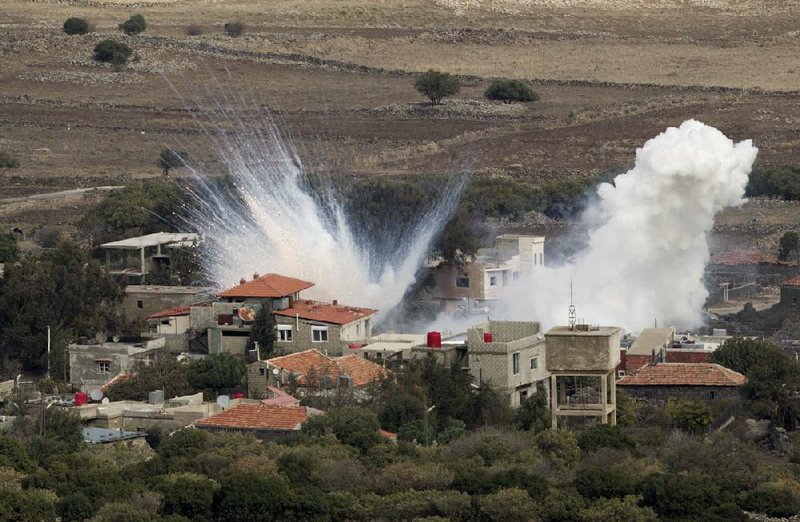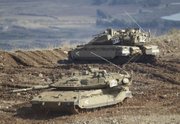GAZIANTEP, Turkey — Syria pulled both Turkey and Israel closer to military entanglements in its civil war Monday, bombing a rebel-held Syrian village a few yards from the Turkish border in a deadly aerial assault and provoking Israeli tank commanders in the disputed Golan Heights into blasting mobile Syrian artillery units across their own armistice line.
The escalations that threatened once again to draw in two of Syria’s most powerful neighbors came hours after the fractious Syrian opposition announced a broad new unity pact that elicited praise from the big foreign powers backing their effort to topple President Bashar Assad.
“It is a big day for the Syrian opposition,” wrote Joshua Landis, an expert on Syrian political history and author of the widely followed Syria Comment blog.
Landis, director of the Center for Middle East Studies at the University of Oklahoma, wrote that the “Assad regime must be worried, as it has survived for 42 years thanks to Syria’s fragmentation.”
INTERACTIVE
There has been speculation that Assad, feeling increasingly threatened, may deliberately seek to widen and further complicate the conflict that has consumed much of his own country for the past 20 months and left roughly 40,000 people dead. Although there is no indication that Assad has decided to try to lure Israel into the fight, any Israeli involvement could rally his failing support and frustrate the efforts of his Arab adversaries.
The attack on the Turkish border, by what Syrian witnesses identified as a Syrian MiG-25 warplane, demolished at least 15 buildings and killed at least 20 people in Ras al-Ayn, the scene of heavy fighting for days and an impromptu crossing point for thousands of Syrian refugees clambering for safety into Turkey.
“The plane appeared in seconds, dropped a bomb and killed children. Here is total chaos,” said Nezir Alan, a doctor who witnessed the bombing.
In a telephone interview from Ras al-Ayn, he said the bombing wounded at least 70 people, 50 of them critically, and Turkish television stations reported that ambulances were rushing victims into Ceylanpinar, Turkey, just across the border.
Windows of shops and houses in Ceylanpinar were shattered by the force of the bombing, and Turkish television footage showed people on both sides of the border running in panic, while military vehicles raced down streets as a huge cloud of smoke hung over the area.
There were no immediate reports of any deaths or injuries in Ceylanpinar. But the Turkish authorities, increasingly angered by what they view as Syrian provocations, have deployed troops and artillery units along the border with Syria and have raised the idea of installing Patriot missile batteries that could deter Syrian military aircraft from getting close.
Turkey’s foreign minister, Ahmet Davutoglu, sent a diplomatic note to Syria on Monday to protest the Ras al-Ayn bombing, the semiofficial Anatolian News Agency reported.
Civilians in southern Turkey’s provinces of Hatay, Sanliurfa and Gaziantep, where the government has erected camps for Syrian refugees, have been advised not to travel close to the border.
Hundreds of thousands of refugees have poured out of Syria, with more than 408,000 in Turkey, Jordan, Lebanon and Iraq now registered with the United Nations.
In Israel, the military said Israeli tanks that are deployed in the Golan Heights, which the Israelis seized from Syria in the 1967 war, had made a direct hit on Syrian artillery units Monday after consecutive days of erratic mortar fire coming from the Syrian side of the armistice line. The Syrian mortar shells caused no damage or casualties.
Military officials and analysts in Israel said they viewed the Syrian shelling as unintentional spillover from the Syrian civil war and that Israel has no desire to get involved in the Syria conflict. But the Israelis have expressed increasing concern that after four decades of relative stability in the Golan area, the Assad government may be trying to push them into a fight that could galvanize Arab hostility toward Israel and distract attention from hisown immediate problems.
“We are closely monitoring what is happening and will respond appropriately. We will not allow our borders to be violated or our citizens to be fired upon,” Prime Minister Benjamin Netanyahu said Monday in a speech to foreign ambassadors.
The Syrian Observatory for Human Rights, a Britain-based, anti-Assad group that relies on a network of activists on the ground in Syria, confirmed fighting in Bir Ajam, saying three rebel fighters were killed Monday.
The United Nations, which monitors an armistice agreement between Israel and Syria in force since the 1973 war, has said it fears that Golan violence could jeopardize the ceasefire.
Meanwhile, an agreement reached Sunday on forming a new Syrian umbrella organization, which could become the basis for a provisional government, was welcomed by participants and the effort’s foreign backers, including Turkey, the United States, the European Union, the Gulf Cooperation Council and the Arab League.
There were expectations that the new group, called the National Coalition of Syrian Revolutionary and Opposition Forces, would be permitted to take Syria’s seat at the Arab League,which expelled Assad’s representative earlier this year. China sidestepped the issue of whether it will recognize the coalition, reiterating its call Monday for all sides in the civil war to join in negotiations.
China and Russia have been criticized by the West for blocking U.N. resolutions aimed at ending Syria’s bloodshed, including calls for Assad to step down.
There was no sign that civil war violence was abating elsewhere inside Syria. Activist groups said warplanes were dropping bombs in Damascus suburbs and that army snipers had taken up positions in areas where bombs had been dropped. The mayhem surrounding central Damascus made residents in the central part of the capital feel increasingly isolated.
“The inside of the city is like a big prison now,” said Alexia Jade, a media activist contacted inside Damascus. “The checkpoints have increased, and the lines of cars waiting to be searched are getting longer.” Information for this article was contributed by Sebnem Arsu, Rick Gladstone, Isabel Kershner, Jodi Rudoren and Hania Mourtada of The New York Times; and by Ariel Schalit, Josef Federman, Lauren E. Bohn, Aron Heller, Suzan Frazer and Mehmet Guzel of The Associated Press.
Front Section, Pages 1 on 11/13/2012


